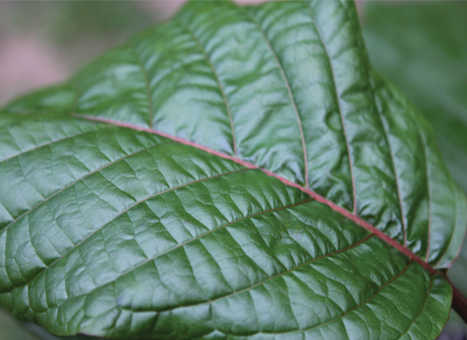Branches bursting with secrets
While mitragynine, 7-hydroxymitragynine and a few dozen other alkaloids make up the bulk of the 57 phytochemicals that have been isolated from kratom leaves, the plants contain a panoply of currently unidentified compounds and metabolites.
“The average plant leaf is somewhere between 35,000 and 50,000 distinct phytochemicals, and we really can identify about 1,000 if we’re lucky,” says Susan Murch, a chemist at the University of British Columbia. “You’re looking at a minimum 34,000 unknowns. In your glass of merlot, you’re looking at 7,000 unknowns; in your cup of coffee, over about 6,800 unknowns.”
 The leaf of Mitragyna speciosa contains at least 34,000 unknown phytochemicals.thorporre/Wikimedia Commons
The leaf of Mitragyna speciosa contains at least 34,000 unknown phytochemicals.thorporre/Wikimedia Commons
Identifying these unknown compounds and mapping their enzymatic relationships to one another by use of mathematical equations is known as metabolomics; each study can take up to three to four years due to its scale. “You do a very small mass spec analysis, and then you spend a year mining data. It’s a massive bioinformatics program,” says Murch.
Murch recently published a literature review in the Journal of Ethnopharmacology that detailed the history and chemistry of kratom and its sister species in Western medical literature with Web of Science, Google Scholar, the Royal Museum for Central Africa, the Internet Archive, the Hathi Trust and the Biodiversity Heritage Library.
Murch and her collaborator Paula N. Brown are hoping to get a metabolomics study involving kratom up and going within the next few years. “There are no metabolomics studies out there that really are definitive in terms of the different varieties, the different strains, the different things people are using,” she says.
Identifying the thousands of unknown metabolites, or intermediary components, within kratom leaves will be essential to understanding how the plant products are differently processed by populations across the globe.
“Kratom is traditionally used by a fairly specific population of Vietnam, Thailand and Southeast Asia, and so we don’t know about its nutrigenomics effects,” says Murch. “Assuming that a population in Southeast Asia will respond the same as a population anywhere else in the world is a bit of a leap of faith.”
Enjoy reading ASBMB Today?
Become a member to receive the print edition four times a year and the digital edition monthly.
Learn moreGet the latest from ASBMB Today
Enter your email address, and we’ll send you a weekly email with recent articles, interviews and more.
Latest in Science
Science highlights or most popular articles

Ragweed compound thwarts aggressive bladder and breast cancers
Scientists from the University of Michigan reveal the mechanism of action of ambrosin, a compound from ragweed, selectively attacks advanced bladder and breast cancer cells in cell-based models, highlighting its potential to treat advanced tumors.

Lipid-lowering therapies could help treat IBD
Genetic evidence shows that drugs that reduce cholesterol or triglyceride levels can either raise or lower inflammatory bowel disease risk by altering gut microbes and immune signaling.

Key regulator of cholesterol protects against Alzheimer’s disease
A new study identifies oxysterol-binding protein-related protein 6 as a central controller of brain cholesterol balance, with protective effects against Alzheimer’s-related neurodegeneration.

From humble beginnings to unlocking lysosomal secrets
Monther Abu–Remaileh will receive the ASBMB’s 2026 Walter A. Shaw Young Investigator Award in Lipid Research at the ASBMB Annual Meeting, March 7-10 in Washington, D.C.

Chemistry meets biology to thwart parasites
Margaret Phillips will receive the Alice and C. C. Wang Award in Molecular Parasitology at the ASBMB Annual Meeting, March 7-10 in Washington, D.C.

ASBMB announces 2026 JBC/Tabor awardees
The seven awardees are first authors of outstanding papers published in 2025 in the Journal of Biological Chemistry.

